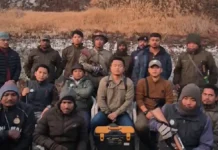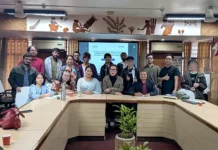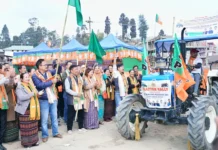NAMSAI, 20 Nov: Deputy Chief Minister Chowna Mein on Saturday virtually participated in the Mountain Legislators Meet (MLM) 2021, held on the third and final day of the 10th Sustainable Mountain Development Summit in Darjeeling (WB) with the theme ‘Pathways for plastic waste management in the Indian Himalayan region’, during which legislators deliberated and discussed the issue of waste crisis in the hill stations of India, especially the growing plastic pollution and its impact on mountain landscapes.
During the meeting, organized by the Integrated Mountain Initiative (IMI), the Darjeeling Himalaya Initiative and the United Nations Environment Programme (UNEP), the members discussed potential solutions and policy mechanisms that can effectively tackle plastic waste in the mountains.
Delivering the keynote address, Mein emphasized on the adverse impact of plastic pollution on the overall health of the people, and highlighted the recent adoption of the declaration on climate change by the Arunachal Pradesh government.
“Today I am proud to inform the august guests of this summit that my state Arunachal Pradesh has become the first state to adopt a climate change declaration by taking a cue from the guidance given by our prime minister on the principles of ‘Panchamrit’,” said Mein.
He informed that, on 13 November, the council of ministers of Arunachal signed the ‘Pakke Tiger Declaration 2047 on Climate Change Resilient & Responsive Arunachal Pradesh’.
He added that, under the ‘Pakke Declaration’, the state government has unanimously agreed to prioritize environment, forest and climate change, health and wellbeing of all, sustainable and adaptive living, livelihoods and opportunities, and evidence generation and collaborative action.
Mein said that climate change is a real threat to the entire Earth.
“All of our homelands are especially vulnerable due to the fragile ecosystem of the Himalayan mountains. We must then take this issue in all its seriousness and deliver outcomes. I strongly believe that we, the mountain states, should strive to become world leaders in adopting climate sustainable initiatives.”
The DCM suggested to the IMI to “take up measures from the Pakke Declaration” and suggest to the other Himalayan states to adopt and implement such resolutions. “Our conditions and concerns are similar for the protection of the environment and the sustenance of the ecosystem,” he said.
Mein urged all the legislators to “join hands in taking up the cause, individually at their constituencies and collectively as mountain legislators.”
Meghalaya Environment & Forest Minister James Sangma brought to attention various crucial issues on the topic, including “the need for bringing nature and economics together for a sustainable, resilient future for the region.”
The meet brought together over 19 elected representatives and former representatives of various bodies from the Indian Himalayan region, and included MPs, MLAs, chairman of autonomous district council, and other prominent members.
The meet included a ‘state-of-affairs presentation’ on the UNEP’s Counter Measure-II project, which aims at informing and influencing national policies, institutions and alliances through the generation and dissemination of scientific knowledge on plastic pollution of rivers in India.
The meet also adopted the MLM 2021 Declaration, acknowledging the urgent need to bring about stringent policies and legislations against single-use plastics due to the fragile Himalayan ecosystem, and resolved to commit to the vision of a ‘zero waste Himalaya’ by urging state governments, union territory administrations, district councils, traditional institutions and other civic bodies to cooperate and collaborate in the fight against plastic pollution.
It also advocated that extended producer responsibility be made feasible to the mountain states by addressing the specificities of mountain economy and bringing in commitment from the industry, and to facilitate and support the contextualization of all waste management rules to be sensitive and acknowledge the regional-specific issues and challenges of mountain/hill states.
The members also declared to engage relevant stakeholders to take proactive steps to explore solutions for sustainable tourism in the Indian Himalayan region, saying it is possible only with the arrest of the existing waste crisis and reducing plastic pollution in the region. (DCM’s PR Cell)




